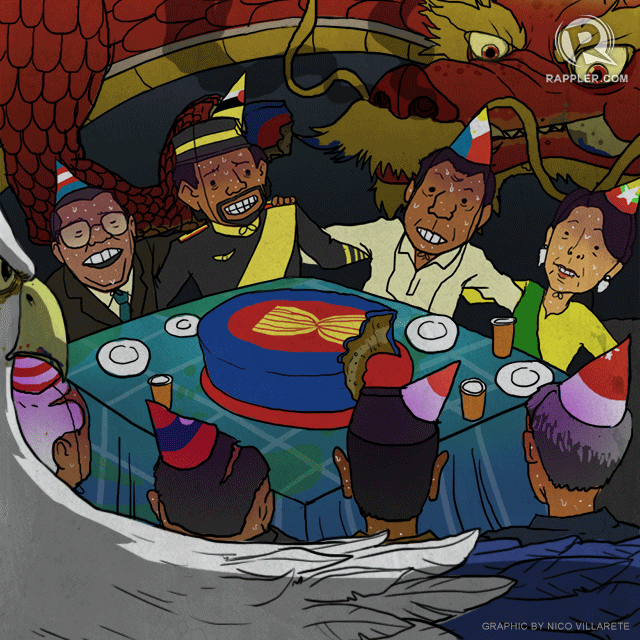SUMMARY
This is AI generated summarization, which may have errors. For context, always refer to the full article.

This week, in the languid city of Vientiane, leaders of the Association of Southeast Asian Nations (ASEAN) gather for their annual meeting, their first after the international arbitral tribunal struck down China’s expansive claims over the South China Sea, claims that competed with those of some ASEAN members.
Before this, the ASEAN foreign ministers also met in the capital of Laos where they avoided mentioning the historic decision in their joint communique. China looms large in the ASEAN, a global power that is source of both aid and investments.
Yet other countries are looking to ASEAN to take the lead in responding to the tribunal’s ruling. While none in ASEAN has openly opposed it, only the Philippines and Vietnam have come out with a strong support, calling for the decision to be respected.
Cambodia, Indonesia, Myanmar, Brunei, Laos, Thailand, Malaysia and Singapore have made neutral statements that did not directly address the tribunal’s ruling. No one wants to step on the giant toes of China.
And central to ASEAN and how it works is the principle of consensus. Even if only one or 2 members object to a certain position, the regional body cannot uphold the majority view.
What is certain, though, is that the issue will not fade away. The South China Sea ruling will continue to cast its long shadow on ASEAN.
On the sidelines of the ASEAN summit, the region’s leaders will also be holding one-on-one meetings with their counterparts from G20 countries, who are concluding their own summit in Hangzhou, China on Monday, September 5.
For the Philippines, it will be President Duterte’s debut in the international stage. He has said that he will not bring up the tribunal ruling during the summit but, rather, in bilateral talks with China.
President Xi Jinping, it has been reported, will not be attending the ASEAN summit but will be sending a representative.
Duterte is scheduled, though, to meet with President Obama and other world leaders with whom he can raise the tribunal ruling as well.
This is just the beginning. The work of the Philippines in rallying ASEAN and international support to respect the ruling will take time. It requires strategic thinking and deft diplomacy.
Next year will be the Philippines’ turn to host the ASEAN. It comes at an important time as ASEAN celebrates its 50th year. How we can parlay this into gains following our country’s victory at The Hague remains a challenge. – Rappler.com
Add a comment
How does this make you feel?
There are no comments yet. Add your comment to start the conversation.